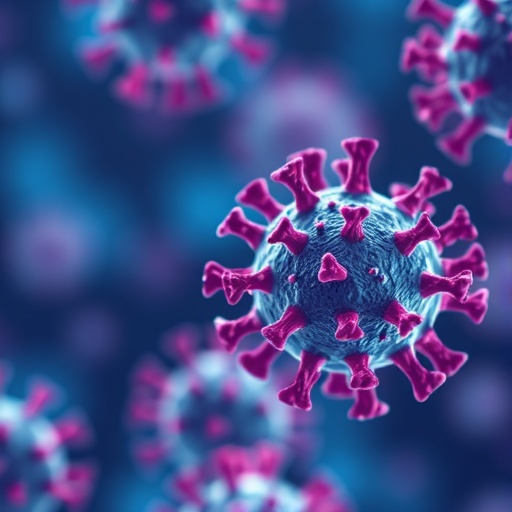MINNEAPOLIS/ST. PAUL – New findings published by researchers at the University of Minnesota Medical School are shedding light on the perplexing persistence of SARS-CoV-2 in immunocompromised cancer patients, even several weeks after respiratory tests return negative. This groundbreaking research, appearing in the esteemed journal iScience, reveals that the virus continues to reside within the gastrointestinal (GI) tract far beyond its detection in nasal swabs, potentially driving ongoing local inflammation and complicating treatment outcomes in this vulnerable population.
During the early stages of the COVID-19 pandemic in 2020, clinicians observed alarming complications in cancer patients who contracted the virus. Notably, some developed severe inflammatory responses that bore resemblance to autoimmune pathologies, complicating their clinical management and treatment trajectories. These clinical puzzles urged researchers to delve deeper into the viral dynamics in immunocompromised hosts, particularly those undergoing hematopoietic or solid organ transplant therapies.
The investigative team centered their study on three cancer patients who had undergone transplant interventions and subsequently experienced severe COVID-19 infections warranting hospitalization. By employing comprehensive tissue analyses and advanced molecular techniques, the researchers identified viral RNA and protein expression within the epithelial lining of the intestines up to six weeks after the final positive nasal swab test had been recorded. This persistence highlights a previously underappreciated viral reservoir in the gut, which may evade standard respiratory-based diagnostic approaches.
Crucially, the presence of SARS-CoV-2 in the intestinal epithelium was not a benign finding. The research demonstrated that persistent viral infection correlated with heightened local immune activation, characterized by increased infiltration of inflammatory cells and marked tissue damage. This pathological milieu appears to exacerbate mucosal barrier disruption, potentially facilitating systemic inflammation and complicating the patients’ recovery or response to transplant therapy.
Central to this inflammatory cascade was the identification of an inflammatory biomarker, SERPINA1, consistently elevated in the affected intestinal tissue samples. SERPINA1, known as alpha-1 antitrypsin, is typically involved in regulating protease activity and modulating inflammatory processes. However, in this context, its upregulation suggests a nuanced role in the pathogenesis of chronic tissue inflammation driven by persistent viral presence. Elevated SERPINA1 could serve as both a prognostic indicator and a potential therapeutic target to mitigate such immune-mediated damage.
Dr. Justin Hwang, Ph.D., an assistant professor and investigator at the University of Minnesota Medical School, emphasized the clinical implication of these findings. He noted that detecting GI tract biomarkers like SERPINA1 prior to initiating intensive transplantation regimens might inform risk stratification and guide tailored therapeutic decisions, ultimately improving patient outcomes. Such biomarker-driven approaches herald a shift toward precision medicine in the management of post-COVID complications among cancer patients.
Moreover, co-author Dr. Emil Lou, MD, Ph.D., underscored that these insights challenge the traditional understanding of COVID-19 as a primarily respiratory illness. The sustained viral presence in the gut underscores the complex tissue tropism of SARS-CoV-2, especially in immunosuppressed hosts. He further pointed out the urgent need for broader studies to unravel whether this persistent intestinal infection contributes to the chronic symptoms observed in Long COVID, particularly within oncologic cohorts.
The study’s implications extend beyond clinical diagnostics and therapeutics. It raises important considerations about the safety and timing of transplant therapies given the risk of exacerbating inflammation in patients harboring persistent GI viral reservoirs. Immunosuppressive regimens commonly employed post-transplant could potentially synergize with viral-driven inflammation to worsen mucosal injury or systemic complications, underscoring the delicate balance needed in managing these complex cases.
This research advocates for vigilant monitoring of SERPINA1 expression levels and other inflammatory markers as part of the pre-transplant evaluation process. It suggests that tailored anti-inflammatory or antiviral interventions targeting the GI tract might be necessary adjuncts to standard cancer care in patients recovering from COVID-19. Such strategies could mitigate inflammation, promote tissue healing, and reduce adverse outcomes related to transplant complications.
Looking forward, the University of Minnesota team aims to expand their research to include larger cohorts of cancer patients and extend analyses to other immunocompromised populations. They also plan to investigate the molecular mechanisms by which SARS-CoV-2 establishes persistence in the gut, evade immune clearance, and incite sustained inflammatory responses. These mechanistic insights may reveal novel therapeutic targets and inform clinical guidelines.
Furthermore, the researchers call attention to the broader implications of viral persistence in non-respiratory tissues, highlighting a paradigm shift in understanding post-viral syndromes. Persistent viral reservoirs could represent a key driver of chronic inflammation and disease sequelae not only in cancer patients but potentially in the general population affected by Long COVID. This line of inquiry opens new avenues for therapeutic innovation and patient management.
The study was generously supported by multiple funding sources including the American Cancer Society, the Litman Family Fund for Cancer Research, and other philanthropic contributors dedicated to advancing the understanding and treatment of cancer and COVID-19 complications. This collaborative effort underscores the intersectional importance of research bridging virology, oncology, and immunology.
As the global community continues to grapple with the evolving challenges of COVID-19, these findings from the University of Minnesota Medical School provide vital insights that could enhance clinical care protocols and improve outcomes for one of the most vulnerable patient groups. The revelation of the intestinal epithelium as a sanctuary site for SARS-CoV-2 in immunocompromised cancer patients is a critical advance warranting widespread recognition and further investigation.
Subject of Research: People
Article Title: SARS-CoV-2 infection drives local inflammation of the intestinal epithelium in immunocompromised patients with cancer
News Publication Date: 10 September 2025
Web References: https://www.cell.com/iscience/fulltext/S2589-0042(25)01699-2, http://dx.doi.org/10.1016/j.isci.2025.113438
References: iScience, DOI: 10.1016/j.isci.2025.113438
Keywords: Cancer research, Long Covid, SARS CoV 2
Tags: advanced molecular techniques in COVID-19 researchcomplications of COVID-19 in transplant patientsCOVID-19 persistence in cancer patientsimmunocompromised cancer treatment challengesinflammatory responses in cancer patientsiScience journal research on COVID-19.ongoing inflammation in cancer treatmentrespiratory tests and COVID-19SARS-CoV-2 gastrointestinal presencesevere COVID-19 infections in immunocompromised hostsUniversity of Minnesota Medical School findingsviral dynamics in cancer therapy





